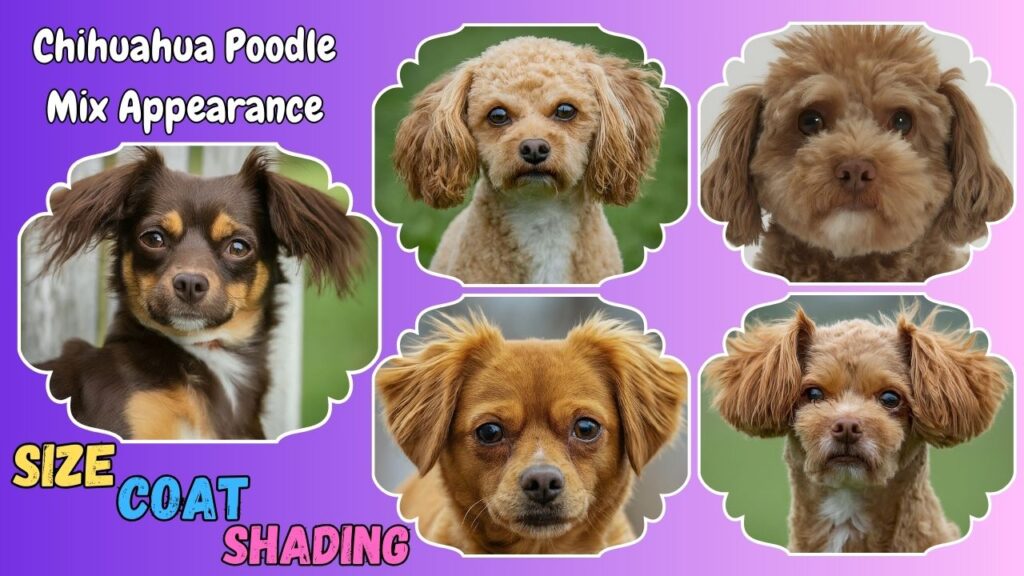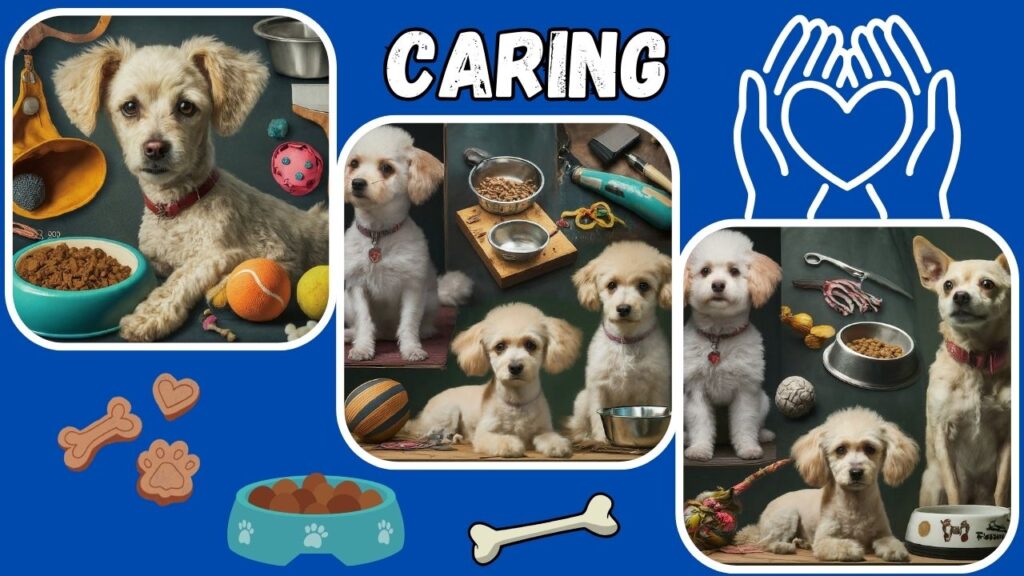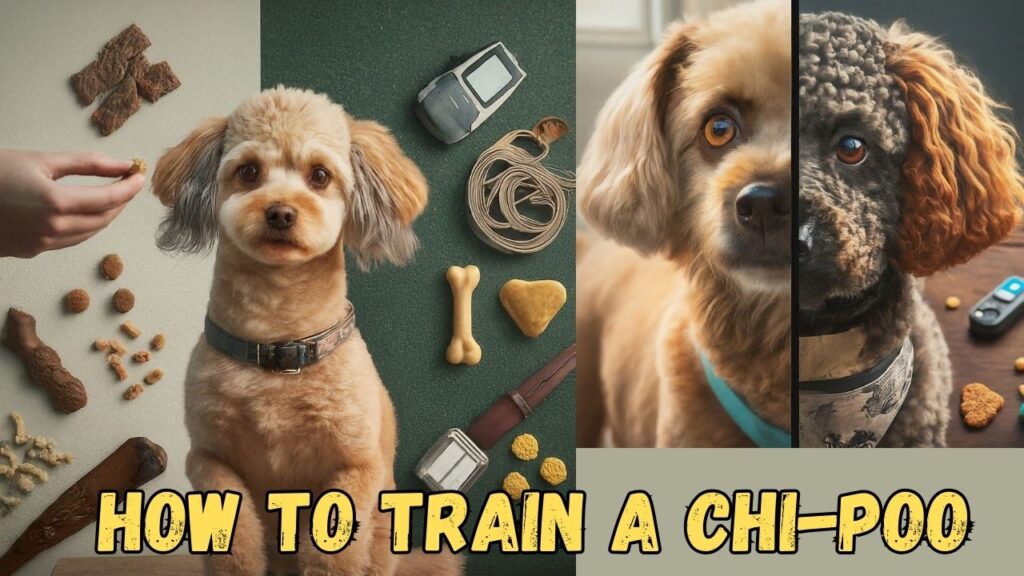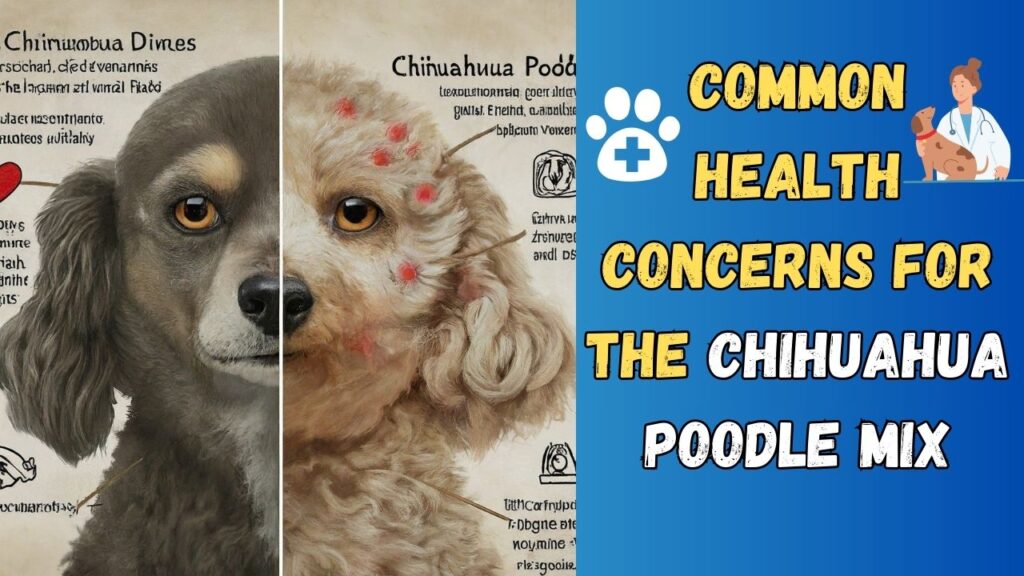Chihuahua Poodle Mix (Chi-Poo): When a Toy or Miniature Poodle crosses with a Chihuahua, a mixed-breed dog known as a Chi-Poo (also called Poochi, Chipoodle, or Poohuahua) is born. These cute little puppies are ideal companions for many households since they have characteristics from both parent breeds.
This post goes in-depth on all the information you require to fall in love with this adorable companion, covering everything from its history to how to take care of it.
The History and Origin of the Chihuahua Poodle Mix Breed
A relatively recent addition to the realm of designer dogs, the Chi-Poo is becoming more and more well-liked because to its clever personality, small stature, and loving demeanor. This breed’s distinguished heritage comes from the beautiful Poodle, which originated in Germany and France, and the ancient Chihuahua of Mexico. The intention with this mix was to combine the best qualities of both parents, and because of the poodle’s influence, the final product is a dog that is not only a wonderful friend but also slightly hypoallergenic.
Chihuahua Poodle Mix Appearance

Feature |
Description |
|---|---|
| Size | usually tiny to medium, weighing between five and fifteen pounds, depending on the size of the parent Poodle. |
| Coat Type | Various; may inherit the smooth hair of the chihuahua, the curly coat of the poodle, or something in between. |
| Coat Color | comprises a variety of mixed or patterned colors as well as black, white, brown, cream, and silver. |
| Eyes | Almond-shaped, often expressive, and with colors ranging from dark brown to hazel. |
| Ears | Can be held high like a Chihuahua or droop like a Poodle; occasionally, one ear may be positioned differently than the other. |
| Tail | usually carried high or across the back and curled or slightly bent. |
| Body Shape | Well-proportioned in stature, compact, and robust, exhibiting qualities from both parent breeds in equal measure. |
| Nose | The nose, which is frequently tiny and delicate, might be brown, black, or the same color as the coat. |
| Paws | Tiny and delicate yet robust, appropriate for their stature, they might have the poodle’s webbed feet. |
| Facial Expression | Conscious and inquisitive, with a frequently eager or cheerful acceptance. |
| Height | Shoulder height is not always the same, usually falling between 5 and 15 inches. |
| Build | For their stature, they are athletic and muscular, displaying strength without being bulky. |
| Head Shape | either have a more elegant, elongated form like the Poodle or a rounder cranium like the Chihuahua. |
| Muzzle | The shape and length can differ; some have a muzzle that is shorter and more akin to a Chihuahua, while others are longer like a Poodle. |
| Gait | brisk and self-assured, with a lively gait that befits their vivacious disposition. |
| Behavioral Traits | Their outside look frequently reflects their lively, playful, and vibrant attitude. |
| Adaptability | Physically, because of their size and energy levels, they can live in both apartment buildings and homes with yards. |
| Social Traits | Grooming can affect how someone looks; longer coats give off a fluffier appearance, while shorter haircuts emphasize their sleekness. |
| Health Indicators | A clean, well-groomed coat and clear, bright eyes are indicators of good health in these mixes. |
| Lifespan Indicator | A healthy Chi-Poo can live for 12 to 15 years, and they frequently maintain their youthful appearance well into old age. |
Chihuahua Poodle Mix Personality and Temperament

Playful and Excited: Chi-Poos frequently inherit the lively nature of Chihuahuas and like games, fetch, and interactive toys.
Intelligent: Poodles are rapid learners and respond well to positive reinforcement training techniques because of their intelligence.
Loyal and affectionate: They develop close relationships with their families and love spending time and hugs with them.
Adaptable: They can fit in with a variety of living arrangements, including tiny houses with yards and apartments.
Caring for a Chihuahua Poodle Mix

The component |
Description |
|---|---|
| Diet | To choose the right diet for your Chi-Poo based on their age, activity level, and any special medical requirements, speak with your veterinarian. Select premium dog food that is age- and nutritionally appropriate. |
| Exercise | Aim for 30 minutes or more of activity each day, which might include plays, walks, and mental stimulation. Their small size may imply that they don’t need to exercise as much, but they are surprisingly active and need both mental and physical stimulation to be happy and healthy. |
| Grooming | Depending on whether their coat inherits the curly coat of a Poodle or the short and smooth coat of a Chihuahua, Chi-Poos have different maintenance requirements. For Chi-Poos with short hair: brushing them once or twice a week is sufficient. Chi-Poos with curly hair: Frequent brushing (every few days) is essential to preventing matting. To keep their coat healthy, think about getting them professionally groomed every four to six weeks. |
| Dental Care | Use dog toothpaste to give your Chi-Poo frequent (preferably daily) dental brushings. This aids in the prevention of dental disease, which little dogs frequently suffer from. |
| Nail Trimming | To keep their nails from growing too long, bothersome or damaging your floors, clip them on a regular basis. Ask your groomer or doctor for help if you’re not comfortable doing this yourself. |
| Vet Care | Make a date for regular checks, vaccines, and parasite treatment with your veterinarian. |
| Socialization | Chi-Poos must be socialized early on due to their tendency toward fearfulness and territorial behavior. From an early age, expose them to a variety of people, animals, and environments to help them grow up to be confident, well-adjusted canines. |
| Training | To create healthy behavior and stop issues like jumping, chewing, or barking, it is essential to provide consistent and positive reinforcement training. Use techniques for positive reinforcement, such as play, praise, and treats, and begin training early. |
| Living Environment | Though they can adapt to a variety of living conditions, Chi-Poos do best in households with older children or adults who can handle them gently because of their small size. |
| Sensitivity to Cold | They may be more susceptible to the cold because of their small stature and possibly thin coat. In colder locations, think about giving them jackets or sweaters when they go for walks. |
| Supervision | For your dog’s protection, always keep an eye on them when they are around little children or other pets. |
How to Train a Chi-Poo

Start early and be consistent.
As early as 8 to 12 weeks old, your Chihuahua Poodle Mix puppy can start training. During this critical developmental window, their brains are most responsive, which makes them more open to learning new behaviors. Establish regular training sessions and adhere to your timetable since consistency is essential.
Positive reinforcement is king.
Give up using severe penalties and switch to techniques of positive reinforcement. Give them their favorite toy, food, or lots of praise when they exhibit desired behaviors. They are more likely to repeat the excellent behavior as a result of the pleasant relationship this makes with it.
Keep it short and sweet.
Because Chihuahua Poodle Mix has short attention spans, training sessions should be brief and interesting, ideally lasting five to ten minutes each. This keeps children from becoming disinterested and bored, which improves the effectiveness of learning.
Master the Basics:
Teach basic commands first, such as “sit,” “stay,” “come,” “down,” and “leave it.” These commands let you efficiently control your Chi-Poo’s behavior and lay the groundwork for more complex training.
Early socialization is crucial.
During their crucial phase of socialization, expose your Chi-Poo puppy to a variety of people, animals, sounds, and situations (up to 16 weeks old). This keeps children from growing up to be afraid or anxious and helps them become accustomed to strange circumstances.
Address unwanted behaviors gently:
To deal with undesirable behaviors like barking, jumping, or chewing, employ gentle redirection and positive reinforcement rather than yelling or scolding. For example, redirect a barking dog toward a toy or use a “down” command, followed by praise and a treat, to divert a jumper.
Seek professional help when needed.
If you run into difficulties when training Chihuahua Poodle Mix, don’t be afraid to get expert assistance from a licensed dog trainer. They are able to successfully handle particular behavioral challenges and offer tailored counseling.
Keep in mind:
Training any dog, including Chi-Poos, requires patience. Raising a contented, well-mannered dog companion will come easily if you are persistent, patient, and optimistic.
Feeding Guide for Your Chihuahua Poodle Mix
Age |
Daily Food Amount (cups) |
Feeding Frequency |
|---|---|---|
| Puppy (8–12 weeks) | ¼ cup (divided into 3-4 meals) | 3–4 times per day |
| Puppy (12-16 weeks) | ½ cup (divided into 3 meals) | 3 times per day |
| Puppy (over 16 weeks) | ½ – ¾ cup (divided into 2-3 meals) | 2-3 times per day |
| Adult (1–7 years) | ¾ cup (divided into 2 meals) | 2 times per day |
| Senior (over 7 years) | ¾ cup (divided into 2 meals) or adjust based on activity level and vet recommendation | 2 times per day |
Common Health Concerns for the Chihuahua Poodle Mix

1. Dental Disease: Chi-Poos’ small mouths make them vulnerable to gum disease and overcrowding of teeth. Frequent dental examinations and brushing are essential.
2. Luxating Patella: A displaced kneecap is the source of this condition, which can make walking difficult or limp.
3. Hypoglycemia: This is a reference to hypoglycemia, which is particularly prevalent in little dogs, such as Chihuahuas. Lethargy, weakness, and convulsions are among the symptoms.
4. Tracheal Collapse: This illness causes the airways to constrict, which causes coughing and breathing difficulties. mostly affects toy poodles, while it can also occur in mixed breeds.
5. Heart Disease: Chihuahuas are frequently concerned about this, particularly valvular disease, which can result in heart failure.
6. Seizures: Chihuahuas may have epilepsy, and Chi-Poos may inherit the condition.
7. Eye Problems: Poodles and Chihuahuas are both susceptible to glaucoma and cataracts, among other eye disorders.
8. Legg-Calve-Perthes Disease: This illness can cause pain and disability since it interferes with the hip joint’s growth. more typical of tiny dogs.
9. Allergies: Chi-Poos may have food or skin allergies, which can itch and cause other discomforts.
10. Dental and Jaw Issues: Due to dental weakness, some Chihuahuas may still have their baby teeth. Dental problems, such as underbites or overbites, can occur in poodles.
Keep in mind: This is by no means a comprehensive list, and any dog may experience unforeseen health issues. Frequent veterinarian examinations are necessary for the early identification and management of any possible problems.
FAQs on Chihuahua Toy Poodle Mix
What are the cons of a Chipoo?
Although they are a generally healthy breed, chipoos can have a few health risks that you should be aware of, such as glaucoma, hypoglycemia, luxating patella, overactive tear glands, and numerous skin conditions.
Do chipotles have health problems?
Cancer, dry skin, digestive difficulties, hypoglycemia (low blood sugar), luxating patellas (basically, a loose knee cap), and a few eye ailments (especially glaucoma, which can cause blindness) are often the most prevalent issues.
How large can a mixed Chihuahua and Poodle grow?
Look. A major factor in the popularity of this small dog breed is its Chipoo size. It’s hardly surprising that the adult Chipoo tends to be rather small, as they are a crossbreed between the Chihuahua and miniature or toy poodle. Typically, a fully mature Chipoo weighs five to twenty pounds.
Is it simple to toilet train chipoos?
At eight weeks, begin housetraining and be firm; otherwise, it can be challenging to completely housebreak them. Although Chipoos are bright and rapidly learn new commands, they have the ability to disregard instructions even when they are familiar with them.
Are mixes of chihuahuas and poodles good for families?
Absolutely, Chi-Poos are wonderful family companions, particularly in homes with older kids who know how to behave politely around little dogs. They enjoy spending time with their human family members and thrive on company.
Can Poodle Mix Chihuahuas live in apartments?
Yes, because of their small size and versatility, Chi-Poos are great apartment pets. To be content and healthy, kids still require regular exercise and mental stimulation.
